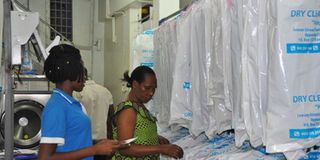Making money from dry cleaning services

A woman inspects her clients’ laundry at one of the local dry cleaning centres on Luwum street in Kampala. PHOTO BY ERONIE KAMUKAMA
What you need to know:
With government willing to provide subsidised facilities to the service industry in form of tax exemptions, among others, business-minded people should seriously consider investing in services such as dry cleaning. Dorothy Nakaweesi explores this business opportunity.
The increasing corporate class in Uganda is creating demand for many services to ease their busy lifestyle. Dry cleaning is one of those services, which if one invests in, would bring bread on the table.
“The demand for dry cleaning services is very high in the city and busy urban and trading centres,” Mr John Musajjakawa, a senior investment officer with the Uganda Investment Authority, says.
Dry cleaning uses non-water-based solvents to remove soil and stains from clothes. It involves cleaning of clothing and textiles using an organic solvent rather than water.
The solvent used is typically tetrachloroethylene (perchloroethylene) in the industry, and ‘dry-cleaning fluid’ by the public. Dry cleaning is necessary for cleaning items that would otherwise be damaged by water and soap or detergents. It is often used instead of hand washing delicate fabrics which can be excessively labourious.
Investment
Mr Daniel Joloba, the chief executive officer at Big Finance, a firm that does advisory and consultancy for small and medium enterprises, says although dry cleaning is a very lucrative business, it requires a lot of capital.
“To thrive in this business one needs to have a source for clients who are mainly the corporates and from the hospitality industry,” Mr Joloba said.
Experts say from this scale of investment, it is estimated at least 100 garments will be cleansed in a day.
A business of this magnitude would mean that the fixed and working capital investment costs for the first year of operation will be in the region of $20,000 to $30,000, which is an equivalent of about Shs72m to Shs108m.
Depending on the clients, the turnaround for this kind of business is estimated at $73,000 (Shs262 million) for the first year of project operation. And in three and a half years, the business should have paid back.
In order to do a professional job, some of the basic items one requires are the dry cleaning machine, flat iron, garment bags, tetrachloroethylene reagents, ironing board, hangers and seats.
“Luckily, all the mentioned equipment are readily available in Uganda,” Mr Musajjakawa says.
Process
A dry-cleaning machine is similar to a combination of a domestic washing machine and clothes dryer. Garments are placed into a washing/extraction chamber (referred to as the basket, or drum), which is the core of the machine.
The washing chamber contains a horizontal, perforated drum that rotates within an outer shell. The shell holds the solvent while the rotating drum holds the garment load. The basket capacity is between 10 and 40 kg.
A typical wash cycle lasts for 8 to 15 minutes depending on the type of garments one is working on and degree of soiling.
Risk
This business has risks of breakdown in machinery. This can be solved by repairing the equipment or making replacements.




